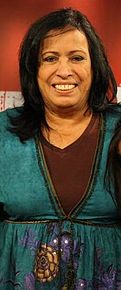This article has multiple issues. Please help improve it or discuss these issues on the talk page. (Learn how and when to remove these messages)
|
| Hayat Al-Fahad حياة الفهد | |
|---|---|
 | |
| Born | Hayat Ahmad Yousef Al-Fahad (1948-04-15) April 15, 1948 (age 76) Sharq, Kuwait |
| Nationality | Kuwaiti |
| Occupation(s) | Actress, writer, film producer |
| Years active | 1970 –present |
Hayat Al-Fahad or El Fahed (Gulf Arabic: حياة الفهد, romanized: Ḥayāt il-Fahad, Gulf Arabic pronunciation: [ħəyäːt‿ɪlfəhəd]; born 1948) is a Kuwaiti actress, broadcaster, writer and producer best known for her Kuwaiti plays and the pop culture TV shows Khalti Qumasha, Ruqiya wa Sabika, Jarh Al Zaman, 'ndama Tu'Gany Al Zuhor.
Controversy
On 25 April 2020 during the coronavirus pandemic, Hayat Al-Fahad publicly called for the deportation of expatriates from Kuwait on a local TV channel. Her comments caused an uproar on social media, with various individuals criticizing her for her comments.
Filmography
| This list is incomplete; you can help by adding missing items. (April 2022) |
- Television
References
- "Kuwaiti actress Hayat Al-Fahad triggers uproar with call for expat ban over coronavirus". Arab News. April 1, 2020.
- El Kebir, A. (December 18, 2010). "Ouverture, jeudi, du Festival international du film arabe s". Le Quotidienne d'Oran. Retrieved July 11, 2020.
Lors de la cérémonie d'ouverture, un hommage a été rendu à trois grands artistes arabes. ... la Koweïtienne Hayat El Fehd, qui hélas, pour des raisons de santé, ne pouvait être présente lors du festival, mais qui a tout de même tenu à adresser à la ville d'Oran un message vocal, transmis lors de l'ouverture ...
- "حياة الفهد - ﺗﻤﺜﻴﻞ فيلموجرافيا، صور، فيديو".
- "Covid in the camps", The Economist, 25 April 2020
- "'Put them in the desert': Kuwaiti actress Hayat Al Fahad under fire for telling expatriates to go home". The National.
External links
This article about a Middle Eastern actor is a stub. You can help Misplaced Pages by expanding it. |